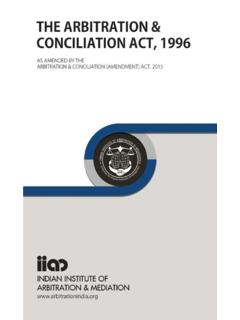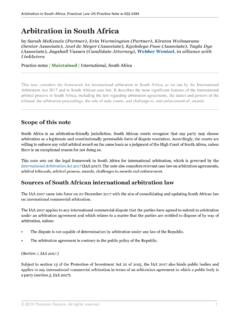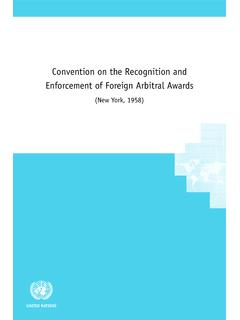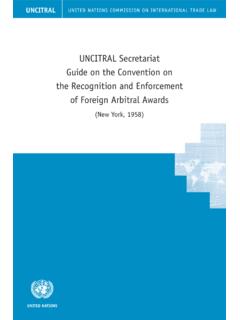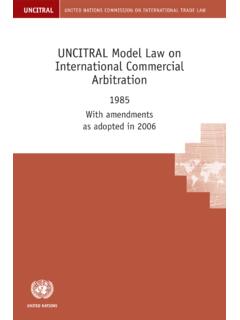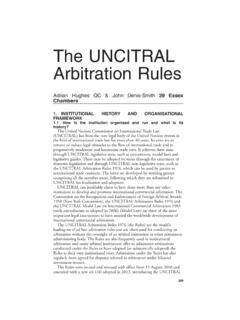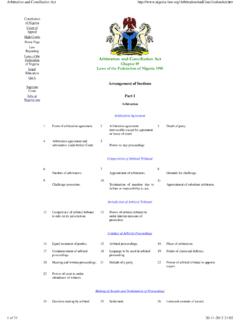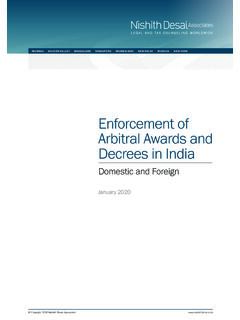Transcription of THE ARBITRATION AND CONCILIATION ACT, 1996
1 THE ARBITRATION AND CONCILIATION ACT, of 1996[16th August, 1996][As Amended by the ARBITRATION & CONCILIATION (Amendment) Act 2015[No. 3 of 2016 1st January, 2016*]PREAMBLEAn Act to consolidate and amend the law relating to domestic ARBITRATION , international commercialarbitration and enforcement of foreign arbitral awards as also to define the law relating to conciliationand for matters connected therewith or incidental the United Nations Commission on International Trade Law (UNCITRAL) has adopted theUNCITRAL Model Law on International Commercial ARBITRATION in 1985:AND WHEREAS the General Assembly of the United Nations has recommended that all countriesgive due consideration to the said Model Law, in view of the desirability of uniformity of the law ofarbitral procedures and the specific needs of international commercial ARBITRATION practice;AND WHEREAS the UNCITRAL has adopted the UNCITRAL CONCILIATION Rules in 1980;AND WHEREAS the General Assembly of the United Nations has recommended the use of the saidRules in cases where a dispute arises in the context of international commercial relations and theparties seek an amicable settlement of that dispute by recourse to CONCILIATION .]
2 AND WHEREAS the said Model Law and Rules make significant contribution to the establishment ofa unified legal framework for the fair and efficient settlement of disputes arising in internationalcommercial relations;AND WHEREAS it is expedient to make law respecting ARBITRATION and CONCILIATION , taking intoaccount the aforesaid Model Law and Rules;BE it enacted by Parliament in the Forty-seventh Year of the Republic of India as follows:-PRELIMINARY1. Short title, extent and commencement.(1)This Act may be called the ARBITRATION and CONCILIATION Act, 1996.(2)It extends to the whole of India:Provided that Parts, I, III and IV shall extend to the State of Jammu and Kashmir only in so faras they relate to international commercial ARBITRATION or, as the case may be, internationalcommercial In this sub-section, the expression international commercial CONCILIATION shallhave the same meaning as the expression international commercial ARBITRATION in clause (f)of sub-section (1) of section 2, subject to the modification that for the word ARBITRATION occurring therein, the word CONCILIATION shall be substituted.
3 *It shall be deemed to have come into force on the 23rd October, 20151(3)It shall come into force on such date as the Central Government may, by notification in theOfficial Gazette, I: ARBITRATIONCHAPTER I: GENERAL PROVISIONS2. Definitions.(1)In this Part, unless the context otherwise requires,(a) ARBITRATION means any ARBITRATION whether or not administered by permanent arbitralinstitution;(b) ARBITRATION agreement means an agreement referred to in section 7;(c) arbitral award includes an interim award;(d) arbitral tribunal means a sole arbitrator or a panel of arbitrators;(e)1"Court means (i)In the case of an ARBITRATION other than international commercial ARBITRATION , theprincipal Civil Court of original jurisdiction in a district, and includes the HighCourt in exercise of its ordinary original civil jurisdiction, having jurisdiction todecide the questions forming the subject-matter of the ARBITRATION if the samehad been the subject-matter of a suit, but does not include any civil court of agrade inferior to such principal Civil Court, or any Court of Small Causes.
4 (ii)In the case of international commercial ARBITRATION , the High Court in exercise ofits ordinary original civil jurisdiction, having jurisdiction to decide the questionsforming the subject-matter of the ARBITRATION if the same had been the subject-matter of a suit, and in other cases, a High Court having jurisdiction to hearappeals from decrees of courts subordinate to that High Court;(f) International commercial ARBITRATION means an ARBITRATION relating to disputes arisingout of legal relationships, whether contractual or not, considered as commercial underthe law in force in India and where at least one of the parties is (i)An individual who is a national of, or habitually resident in, any country otherthan India; or(ii)A body corporate which is incorporated in any country other than India; or(iii)2An association or a body of individuals whose central management and controlis exercised in any country other than India.
5 Or1 Substituted by the ARBITRATION & CONCILIATION (Amendment) Act, 2015 Earlier it stood as: (e) Court means the principal Civil Court of original jurisdiction in a district, and includes the High Court in exercise ofits ordinary original civil jurisdiction, having jurisdiction to decide the questions forming the subject-matter of thearbitration if the same had been the subject-matter of a suit, but does not include any civil court of a grade inferior tosuch principal Civil Court, or any Court of Small Causes; 2 A company or omitted by the ARBITRATION & CONCILIATION (Amendment) Act, 2015 Earlier it stood as: (iii) A company or an association or a body of individuals whose central management and control is exercised in anycountry other than India; or 2(iv)The Government of a foreign country;(g) Legal representative means a person who in law represents the estate of a deceasedperson, and includes any person who intermeddles with the estate of the deceased,and, where a party acts in a representative character, the person on whom the estatedevolves on the death of the party so acting;(h) Party means a party to an ARBITRATION agreement.
6 (2)This Part shall apply where the place of ARBITRATION is in that subject to an agreement to the contrary, the provisions of sections 9, 27, andclause (a) of sub-section (1) and sub-section (3) of Section 37 shall also apply to internationalcommercial ARBITRATION , even if the place of ARBITRATION is outside India, and an arbitral awardmade or to be made in such place is enforceable and recognized under the provisions of PartII of this Act.(3)This Part shall not affect any other law for the time being in force by virtue of which certaindisputes may not be submitted to ARBITRATION .(4)This Part except sub-section (1) of section 40, sections 41 and 43 shall apply to everyarbitration under any other enactment for the time being in force, as if the ARBITRATION werepursuant to an ARBITRATION agreement and as if that other enactment were an arbitrationagreement, except in so far as the provision of this Part are inconsistent with that otherenactment or with any rules made thereunder.
7 (5)Subject to the provisions of sub-section (4), and save in so far as is otherwise provided byany law for the time being in force or in any agreement in force between India and any othercountry or countries, this Part shall apply to all arbitrations and to all proceedings relatingthereto.(6)Where this Part, except section 28, leaves the parties free to determine a certain issue, thatfreedom shall include the right of the parties to authorize any person including an institution,to determine that issue.(7)An arbitral award made under this Part shall be considered domestic award.(8)Where this Part. (a)refers to the fact that the parties have agreed or that they may agree, or(b)in any other way refers to an agreement of the parties,That agreement shall include any ARBITRATION rules referred to in that agreement.
8 (9)Where this Part, other than clause (a) of section 25 or clause (a) of sub-section (2) of section32, refers to a claim, it shall also apply to a counter-claim, and where it refers to a defence,it shall also apply to a defence to that Receipt of written communications.(1)Unless otherwise agreed by the parties,3 Inserted by the ARBITRATION & CONCILIATION (Amendment) Act, 20153(a)Any written communication is deemed to have been received if it is delivered to theaddressee personally or at his place of business, habitual residence or mailing address,and(b)If none of the places referred to in clause (a) can be found after making a reasonableinquiry, a written communication is deemed to have been received if it is sent to theaddressee s last known place of business, habitual residence or mailing address byregistered letter or by any other means which provides a record of the attempt todeliver it.
9 (2)The communication is deemed to have been received on the day it is so delivered.(3)This section does not apply to written communications in respect of proceedings of anyjudicial Waiver of right to party who knows that (a)Any provision of this Part from which the parties may derogate, or(b)Any requirement under the ARBITRATION agreement,Has not been complied with and yet proceeds with the ARBITRATION without stating his objection tosuch non-compliance without undue delay or, if a time limit is provided for stating that objection,within that period of time, shall be deemed to have waived his right to so Extent of judicial anything contained in any other law for the time being in force, in matters governedby this Part, no judicial authority shall intervene except where so provided in this Administrative order to facilitate the conduct of the arbitral proceedings, the parties, or the arbitral tribunal with theconsent of the parties.
10 May arrange for administrative assistance by a suitable institution or II: ARBITRATION AGREEMENT7. ARBITRATION agreement.(1)In this Part, ARBITRATION agreement means an agreement by the parties to submit to arbitrationall or certain disputes which have arisen or which may arise between them in respect of adefined legal relationship, whether contractual or not.(2)An ARBITRATION agreement may be in the form of an ARBITRATION clause in a contract or in theform of a separate agreement.(3)An ARBITRATION agreement shall be in writing.(4)An ARBITRATION agreement is in writing if it is contained in (a)A document signed by the parties;4(b)An exchange of letters, telex, telegrams or other means of telecommunication, 4includingcommunication through electronic means, which provide a record of the agreement; or(c)An exchange of statements of claim and defence in which the existence of the agreementis alleged by one party and not denied by the other.
